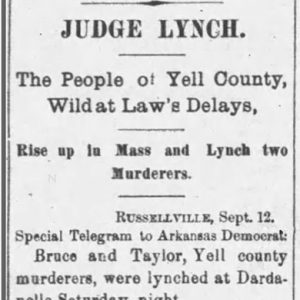calsfoundation@cals.org
Dardanelle Lynching of 1881
On September 10, 1881, two white men—J. F. Bruce and John Taylor—were lynched in Dardanelle (Yell County) for the alleged crime of murder.
J. F. Bruce had been accused of the murder of John L. White the previous February. As the Arkansas Democrat reported, Bruce, White, and other men were “camped on the Danville road, some two or three miles from Dardanelle,” when they began drinking whiskey, “partaking of the usual amount necessary to cause a fight.” That fight ended in the murder of White, whose brother was a local magistrate and “one of the most esteemed and worthy citizens of Yell county.” Taylor, according to the Democrat, reportedly “murdered a man in the bottoms below Dardanelle.” A later report in the Arkansas Gazette gave his victim’s name as Thomas White and noted that White had been “acting as one of a constable’s posse in arresting Taylor…on the charge of a small misdemeanor.” While resisting arrest, Taylor fired on White, who later died from his wounds.
The 1880 census records one James F. Bruce, age thirty-seven, residing in Riley Township in Yell County with his wife, daughter-in-law, and stepson. He worked as a farmer. There is also a John Taylor, age thirty-eight, residing in Wilson Township with his wife and three young children; he worked as a farm laborer.
The Gazette quoted a detailed account of the lynching taken from the September 16 Independent Arkansian. According to this account, at approximately 12:30 a.m., five or six armed men went to the house of Deputy Sheriff George W. Cole and demanded the keys to the jail. A few of the men remained to guard him while the others left. Other men who were on the streets that night, such as J. P. Byers and Charley Goodman, were “arrested” by members of the mob, numbering fifty to sixty people, and “held until the work was over.” In keeping with many of the tropes of lynching reports, the mob was described as moving “so gently, and with such perfect order that they created no disturbance.” The mob was able to obtain a key from the city marshal and enter the jail and subdue the guards, Jehu Burton and James Jones. The mob demanded the keys, which the guards denied having, but members of the mob later found them and proceeded.
According to this report, neither Bruce nor Taylor actively resisted, although Bruce said, “I didn’t know what I was doing when I killed that man. I want to live for my wife and children.” The mob hanged the two men, “one in each of the rear corners of the stockade, with a long grass rope, hangman style.” Soon after the departure of the mob, Cole arrived and notified the county judge and the coroner, in addition to sending word to the families of the lynched men. A jury of inquest was assembled, but no one was ever charged for participation in the lynching.
An earlier attempt had been made to lynch the two men while they were being held in the Danville (Yell County) jail, but the effort was thwarted by the prisoners being relocated to the Dardanelle jail. In a September 9, 1881, editorial on that earlier attempt, the Arkansas Democrat insisted, “The very foundation pillars of society are broken down by the rule of the mob,” adding that “there can be no doubt that there is a culpable and shameful inefficiency in the administration of our criminal laws. But it will not do to fly to a greater evil to correct even a gigantic abuse.” However, in its September 12, 1881, report on the event, the same newspaper described the lynching that had taken place as simply “the story of the people who believe themselves outraged by the law’s delays, and have taken the execution of murderers into their own hands.”
This was not the only lynching in Dardanelle in 1881. In November of that year, Jim Holland was lynched inside the jail. A report in the Fayetteville Weekly Democrat noted that the mob had also sought another murderer named Burris, but said that he had been moved to the jail at Dover (Pope County).
For additional information:
“Judge Lynch.” Arkansas Democrat, September 12, 1881, p. 4.
“Mob Law in Yell County.” Arkansas Gazette, September 17, 1881, p. 4.
“Terrible Avengers.” Fayetteville Weekly Democrat, September 29, 1881, p. 4.
“The Wrong Way.” Arkansas Democrat, September 9, 1881, p. 2.
Staff of the CALS Encyclopedia of Arkansas







Comments
No comments on this entry yet.